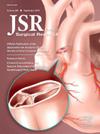评估外科住院医生肌肉骨骼疼痛和人体工程学的跨专业方法。
IF 1.8
3区 医学
Q2 SURGERY
引用次数: 0
摘要
导言:与工作相关的肌肉骨骼损伤在普外科医生中很常见,会导致慢性疼痛和误工。然而,在住院医师培训项目中,正式的人体工程学课程却很少见。我们旨在与职业治疗(OT)专业的学生合作,对普外科住院医师工效学跨专业教育方法的可行性进行评估:方法:普外科住院医师完成了一项有关肌肉骨骼疼痛和人体工程学的调查。职业治疗专业的学生拍摄了 4 周内受训者进行开腹和腹腔镜腹部手术的照片。快速全身评估(REBA)和快速上肢评估用于评估人体工程学效率和姿势风险。得分越高代表姿势越不正确,与改变人体工程学的需要相关:共有 37/44 人(84%)做出了回应。每个人都报告了与手术有关的某种程度的疼痛,最常见的是颈部疼痛(75%)、肩部疼痛(61%)和足部疼痛(53%)。大多数住院医师(66%)感到有压力,无论疼痛与否,都必须进行手术。只有不到 11% 的住院医师报告了由教师指导的符合人体工学的休息时间。职业技术学院的学生共对外科学员进行了 11 次术中观察,上肢快速评估平均得分为 6.1 分,全身快速评估平均得分为 7.3 分。这些评分显示了不理想的姿势,建议及时改变:本研究传达了一种成功的跨专业教育方法,用于评估普外科住院医师的手术工效学。普外科住院医师中普遍存在肌肉骨骼症状和术中人体工学功能障碍,但却没有采取工作场所管理或预防措施。这项需求评估将用于为外科住院医师制定一项人体工程学计划。本文章由计算机程序翻译,如有差异,请以英文原文为准。
An Interprofessional Approach to Assessing Musculoskeletal Pain and Ergonomics in Surgery Residents
Introduction
Work-related musculoskeletal injuries are common in general surgeons, causing chronic pain and lost work. However, formal ergonomic curriculums in residency programs are rare. We aimed to assess the feasibility of an interprofessional educational approach to ergonomics in general surgery residents, in collaboration with occupational therapy (OT) students.
Methods
General surgery residents completed a survey regarding musculoskeletal pain and ergonomics. OT students captured photos of trainees performing open and laparoscopic abdominal surgery over a 4-wk period. Rapid entire body assessment (REBA) and the rapid upper limb assessment were used to assess ergonomic efficiency and postural risk. Higher scores represent unfavorable posture and correlate with the need for ergonomic change.
Results
There were 37/44 (84%) responses. Everyone reported some degree of pain related to surgery, most commonly neck pain (75%), shoulder (61%), and foot pain (53%). Most residents (66%) felt the pressure to perform surgery regardless of the pain. Ergonomic breaks directed by faculty were reported by less than 11% of residents. A total of 11 intraoperative observations were made by OT students of surgical trainees, with a mean rapid upper limb assessment score of 6.1 and a mean rapid entire body assessment score of 7.3. These scores demonstrated suboptimal posture with recommendations for prompt change.
Conclusions
This study conveys a successful interprofessional educational approach to assessing surgical ergonomics in general surgery residents. Musculoskeletal symptoms and intraoperative ergonomic dysfunctions are prevalent among general surgery residents, without workplace measures for management or prevention. This needs assessment will be used to create an ergonomics initiative for the surgery residency.
求助全文
通过发布文献求助,成功后即可免费获取论文全文。
去求助
来源期刊
CiteScore
3.90
自引率
4.50%
发文量
627
审稿时长
138 days
期刊介绍:
The Journal of Surgical Research: Clinical and Laboratory Investigation publishes original articles concerned with clinical and laboratory investigations relevant to surgical practice and teaching. The journal emphasizes reports of clinical investigations or fundamental research bearing directly on surgical management that will be of general interest to a broad range of surgeons and surgical researchers. The articles presented need not have been the products of surgeons or of surgical laboratories.
The Journal of Surgical Research also features review articles and special articles relating to educational, research, or social issues of interest to the academic surgical community.

 求助内容:
求助内容: 应助结果提醒方式:
应助结果提醒方式:


